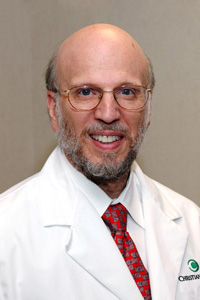William Weintraub, M.D., co-authors major cardiovascular studies


In patients whose bad cholesterol is well-controlled by statins for a long time period, the addition of high-dose, extended release niacin did not reduce the risk of cardiovascular events, including heart attack and stroke.
That is the finding reported at the American Heart Association annual meeting and published as the lead article in the Nov. 15 edition of the New England Journal of Medicine.
William Weintraub, M.D., the John H. Ammon Chair of Cardiology at Christiana Care, was a co-author of the study, the Atherothrombosis Intervention in Metabolic Syndrome with Low HDL/High Triglycerides: Impact on Global Health (AIM-HIGH).
The purpose of the study was to find out if—in the setting of well-treated LDL (“bad” cholesterol levels) and low HDL (“good” cholesterol levels)/elevated triglycerides—there was an incremental benefit of adding extended-release niacin. Niacin, also known as vitamin B3, helps to raise HDL cholesterol and lower triglycerides.
“If you are a patient with stable cardiovascular disease who has achieved and maintained very low levels of LDL cholesterol on a statin for a long time period, these research findings indicate the addition of high-dose niacin does not improve your risk for future events, and is not needed,” explains Dr. Weintraub.
Many patients with stable heart and vascular disease are still at high risk for cardiac death, heart attack or stroke even after their LDL cholesterol has reached ideal levels—between 40 and 80 mg/dL on statin therapy. It is believed that this increased residual risk occurs because they have too little HDL cholesterol along with high levels of triglycerides.
In the study, 1,718 patients received a high-dose (1,500 to 2,000 mg per day) of extended-release niacin, while 1,696 patients received a placebo.
After two years, HDL and triglyceride levels improved in the niacin group, with a 25 percent increase in good cholesterol, a 29 percent drop in triglycerides and a further decrease in bad cholesterol of approximately 12 percent. By contrast, in the placebo group, there was minimal change, with a 10 percent increase in good cholesterol and an eight percent drop in triglycerides.
Because of the lack of benefit, the National Heart, Lung and Blood Institute, upon the recommendation of its Data Safety Monitoring Committee, decided to stop the trial 18 months before its planned completion.
Dr. Weintraub co-authored another study published in the Oct. 5 Journal of the American Medical Association that examined patients undergoing elective percutaneous coronary intervention (PCI), a procedure using balloon angioplasty or stent placement to open narrowed arteries of the heart.
In that study investigators observed nearly equivalent rates of hospitalization and mortality at two and 30 days when compared with patients who stayed overnight. Among selected Medicare patients, same-day discharge is still uncommon.
“The outcomes data was nearly identical,” said Dr. Weintraub. “The study tells us there are a large number of patients who remain in the hospital overnight following PCI who could safely be sent home the same day they have the procedure.”
The study evaluated the prevalence and outcomes of same-day discharge among 107,018 patients 65 years or older undergoing elective PCI in the United States. Data were collected from the American College of Cardiology CathPCI Registry (November 2004 to December 2008), which includes Christiana Care’s Center for Heart & Vascular Health, and linked with Medicare Part A claims.
PCI is one of the most commonly performed cardiac procedures, with more than 1 million episodes of care annually among Medicare recipients.